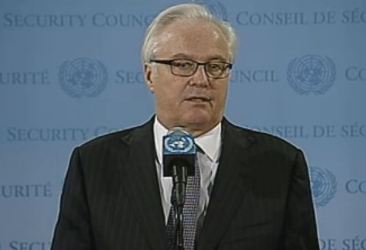American and Russian envoys trade accusations on Sudan-South Sudan UNSC statement
March 13, 2013 (NEW YORK) – America and Russian envoys to the United Nations accused each other of hampering Security Council efforts to push Sudan and South Sudan to implement the signed agreements and settle the remaining outstanding issues.

Following the meeting, U.S. Ambassador Susan Rice , in remarks to the media, expressed hope that the Council would keep closely following the situation and “place a premium on monitoring effective implementation”. She also underlined the “dire” humanitarian situation in the Blue Nile and South Kordofan states and the stalled talks over Abyei’s referendum.
Rice went to disclose that the Security Council failed to agree on a joint statement on the recent agreements inked in Addis Ababa. She accused Russia of blocking a draft presidential statement they submitted since two weeks to the Council’s 15 members, by proposing another version only dealing with the recent developments.
The Russian proposed statement “only discussed a very narrow aspect of the substance of the (US drafted) press statement and excluded language on the Two Areas, excluded mention of the cross border incidents, including the aerial bombardments, (…) and which did not mention the situation in Abyei”, Rice said.
“We therefore objected to the issuance of a press statement that was—or even elements to the press—that were divorced from the larger set of issues”, she stressed.
To counter the criticism that Rice directed against his position, Russian Ambassador Vitaly I. Churkin who assumes the rotating presidency of the Council, regretted that the American envoy disclosed the content of a confidential discussion and focused on the half-full of the bottle.
Churkin underscored that they proposed a short statement to praise the signed agreements because the situation had “changed completely since two week ago” and also because the Russian drafted statement does not aim to obstruct the American draft because it deals only with some of its aspects.
“We are not working against anything. We are working for something. In this case, we are working for the Security Council to try to make positive contributions to the talks between Sudan and South Sudan”, he said.
He emphasised that Rice’s position “was not reasonable” and as result “we were not able to have any agreed reaction” to the signing of the implementation matrix.
He added they will consider what the U.S. draft statement contains and determine their position accordingly.
“But this was not a constructive way to deal with the work at the Security Council”, Churkin concluded.
Some international diplomats in New York explained the skirmish between the two diplomats by the revival of “combative foreign policy approach” adopted by the Russian President Vladimir Putin which is visible when it comes to Moscow policy on Iran and Syria.
However some other diplomats in statements to Foreign Policy blamed Rice for her refusal to compromise saying her insistence on hard-line policy towards Khartoum “resulted in the council’s inability to weigh in on many key aspects of the crisis since May 2012”.
However, the Sudanese ambassador to the United Nation Daffa-Alla Elhag Ali Osman welcomed the “Russian Spring” and used the opportunity to denounce Rice, without naming her, for its position against the draft statement proposed by the Ambassador Churkin.
“There is no reason for whatsoever for anybody in the Security Council to block any outcome from the Security Council to encourage the two parties”, he said with a sly smile.
(ST)
